The Impact of Social Networking on Youth: Positive or Harmful?
VerifiedAdded on 2023/01/11
|8
|1827
|99
AI Summary
This study examines the effects of social networking on the youth, discussing both the advantages and disadvantages. It explores the impact on education, addiction, psychological states, and academic performance.
Contribute Materials
Your contribution can guide someone’s learning journey. Share your
documents today.

Running head: SOCIAL NETWORKING
SOCIAL NETWORKING
Name of the Student
Name of the Organization
Author Note
SOCIAL NETWORKING
Name of the Student
Name of the Organization
Author Note
Secure Best Marks with AI Grader
Need help grading? Try our AI Grader for instant feedback on your assignments.
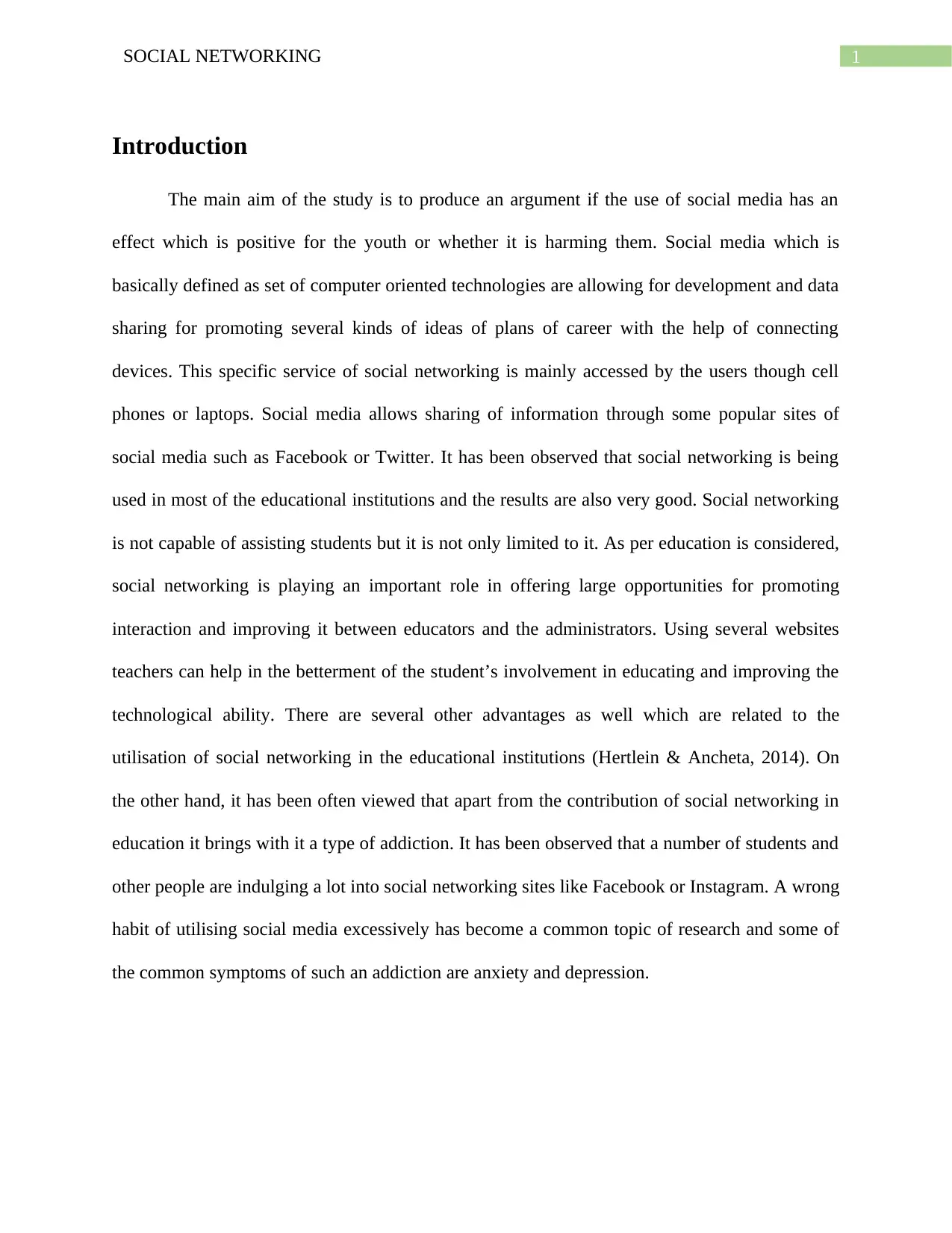
1SOCIAL NETWORKING
Introduction
The main aim of the study is to produce an argument if the use of social media has an
effect which is positive for the youth or whether it is harming them. Social media which is
basically defined as set of computer oriented technologies are allowing for development and data
sharing for promoting several kinds of ideas of plans of career with the help of connecting
devices. This specific service of social networking is mainly accessed by the users though cell
phones or laptops. Social media allows sharing of information through some popular sites of
social media such as Facebook or Twitter. It has been observed that social networking is being
used in most of the educational institutions and the results are also very good. Social networking
is not capable of assisting students but it is not only limited to it. As per education is considered,
social networking is playing an important role in offering large opportunities for promoting
interaction and improving it between educators and the administrators. Using several websites
teachers can help in the betterment of the student’s involvement in educating and improving the
technological ability. There are several other advantages as well which are related to the
utilisation of social networking in the educational institutions (Hertlein & Ancheta, 2014). On
the other hand, it has been often viewed that apart from the contribution of social networking in
education it brings with it a type of addiction. It has been observed that a number of students and
other people are indulging a lot into social networking sites like Facebook or Instagram. A wrong
habit of utilising social media excessively has become a common topic of research and some of
the common symptoms of such an addiction are anxiety and depression.
Introduction
The main aim of the study is to produce an argument if the use of social media has an
effect which is positive for the youth or whether it is harming them. Social media which is
basically defined as set of computer oriented technologies are allowing for development and data
sharing for promoting several kinds of ideas of plans of career with the help of connecting
devices. This specific service of social networking is mainly accessed by the users though cell
phones or laptops. Social media allows sharing of information through some popular sites of
social media such as Facebook or Twitter. It has been observed that social networking is being
used in most of the educational institutions and the results are also very good. Social networking
is not capable of assisting students but it is not only limited to it. As per education is considered,
social networking is playing an important role in offering large opportunities for promoting
interaction and improving it between educators and the administrators. Using several websites
teachers can help in the betterment of the student’s involvement in educating and improving the
technological ability. There are several other advantages as well which are related to the
utilisation of social networking in the educational institutions (Hertlein & Ancheta, 2014). On
the other hand, it has been often viewed that apart from the contribution of social networking in
education it brings with it a type of addiction. It has been observed that a number of students and
other people are indulging a lot into social networking sites like Facebook or Instagram. A wrong
habit of utilising social media excessively has become a common topic of research and some of
the common symptoms of such an addiction are anxiety and depression.
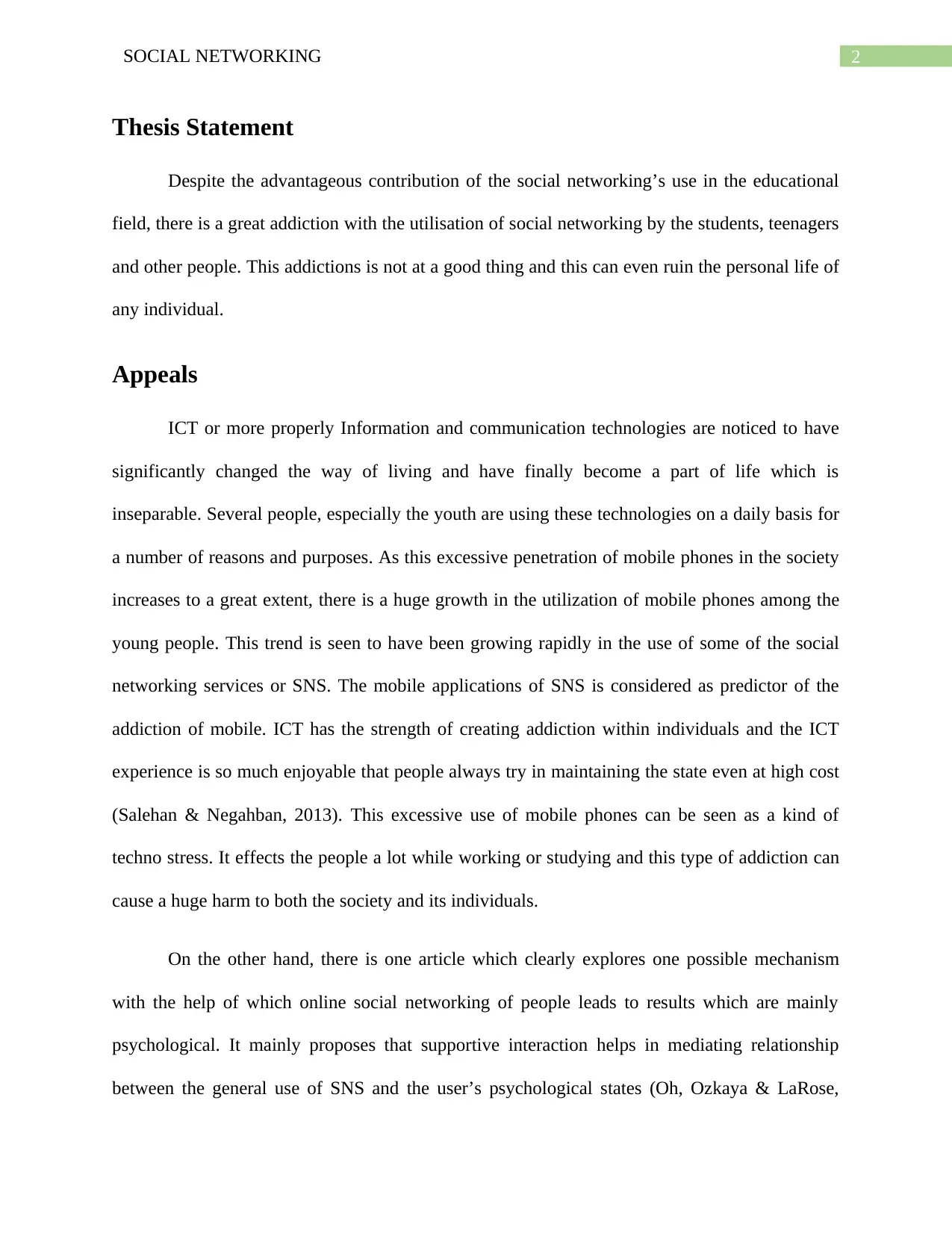
2SOCIAL NETWORKING
Thesis Statement
Despite the advantageous contribution of the social networking’s use in the educational
field, there is a great addiction with the utilisation of social networking by the students, teenagers
and other people. This addictions is not at a good thing and this can even ruin the personal life of
any individual.
Appeals
ICT or more properly Information and communication technologies are noticed to have
significantly changed the way of living and have finally become a part of life which is
inseparable. Several people, especially the youth are using these technologies on a daily basis for
a number of reasons and purposes. As this excessive penetration of mobile phones in the society
increases to a great extent, there is a huge growth in the utilization of mobile phones among the
young people. This trend is seen to have been growing rapidly in the use of some of the social
networking services or SNS. The mobile applications of SNS is considered as predictor of the
addiction of mobile. ICT has the strength of creating addiction within individuals and the ICT
experience is so much enjoyable that people always try in maintaining the state even at high cost
(Salehan & Negahban, 2013). This excessive use of mobile phones can be seen as a kind of
techno stress. It effects the people a lot while working or studying and this type of addiction can
cause a huge harm to both the society and its individuals.
On the other hand, there is one article which clearly explores one possible mechanism
with the help of which online social networking of people leads to results which are mainly
psychological. It mainly proposes that supportive interaction helps in mediating relationship
between the general use of SNS and the user’s psychological states (Oh, Ozkaya & LaRose,
Thesis Statement
Despite the advantageous contribution of the social networking’s use in the educational
field, there is a great addiction with the utilisation of social networking by the students, teenagers
and other people. This addictions is not at a good thing and this can even ruin the personal life of
any individual.
Appeals
ICT or more properly Information and communication technologies are noticed to have
significantly changed the way of living and have finally become a part of life which is
inseparable. Several people, especially the youth are using these technologies on a daily basis for
a number of reasons and purposes. As this excessive penetration of mobile phones in the society
increases to a great extent, there is a huge growth in the utilization of mobile phones among the
young people. This trend is seen to have been growing rapidly in the use of some of the social
networking services or SNS. The mobile applications of SNS is considered as predictor of the
addiction of mobile. ICT has the strength of creating addiction within individuals and the ICT
experience is so much enjoyable that people always try in maintaining the state even at high cost
(Salehan & Negahban, 2013). This excessive use of mobile phones can be seen as a kind of
techno stress. It effects the people a lot while working or studying and this type of addiction can
cause a huge harm to both the society and its individuals.
On the other hand, there is one article which clearly explores one possible mechanism
with the help of which online social networking of people leads to results which are mainly
psychological. It mainly proposes that supportive interaction helps in mediating relationship
between the general use of SNS and the user’s psychological states (Oh, Ozkaya & LaRose,
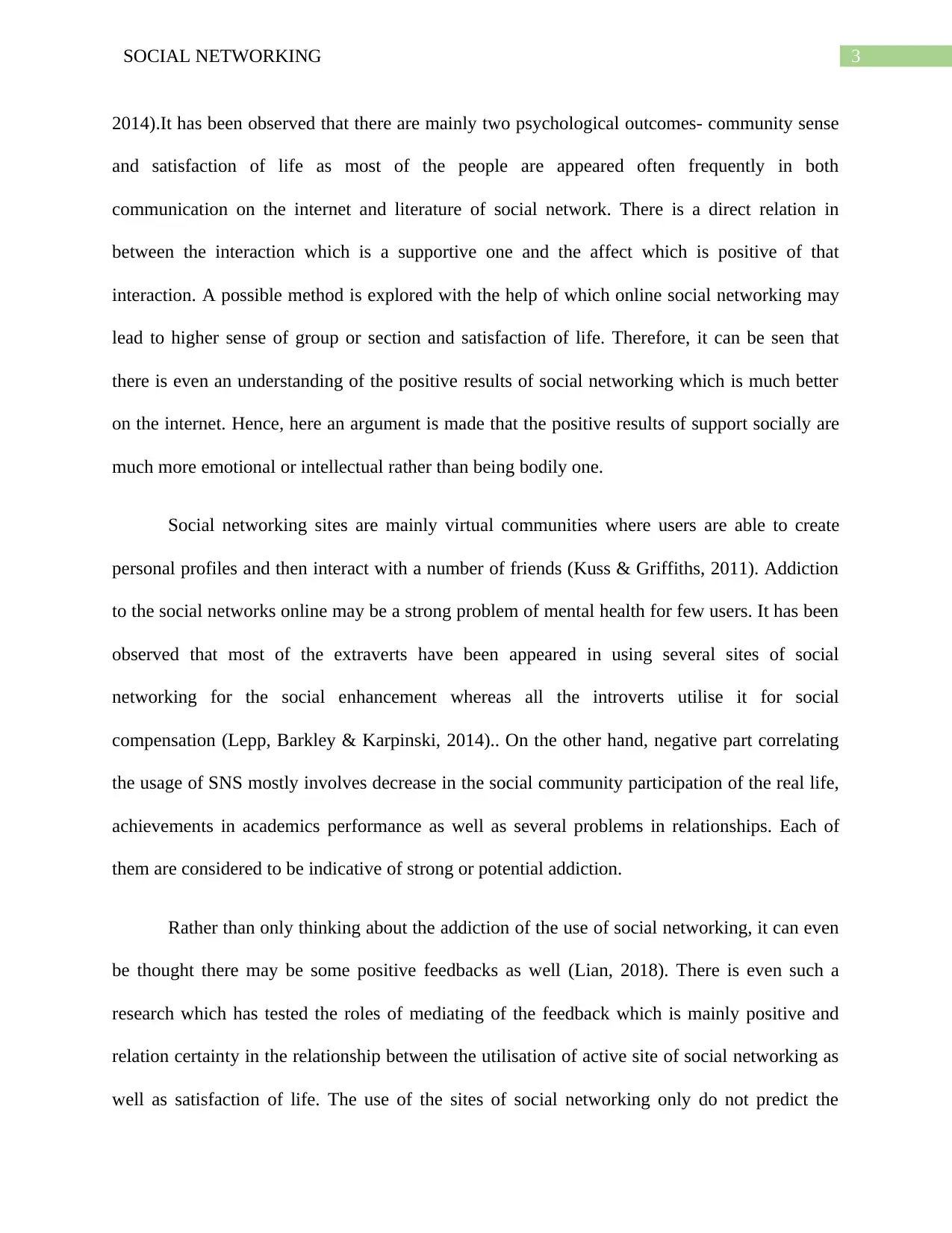
3SOCIAL NETWORKING
2014).It has been observed that there are mainly two psychological outcomes- community sense
and satisfaction of life as most of the people are appeared often frequently in both
communication on the internet and literature of social network. There is a direct relation in
between the interaction which is a supportive one and the affect which is positive of that
interaction. A possible method is explored with the help of which online social networking may
lead to higher sense of group or section and satisfaction of life. Therefore, it can be seen that
there is even an understanding of the positive results of social networking which is much better
on the internet. Hence, here an argument is made that the positive results of support socially are
much more emotional or intellectual rather than being bodily one.
Social networking sites are mainly virtual communities where users are able to create
personal profiles and then interact with a number of friends (Kuss & Griffiths, 2011). Addiction
to the social networks online may be a strong problem of mental health for few users. It has been
observed that most of the extraverts have been appeared in using several sites of social
networking for the social enhancement whereas all the introverts utilise it for social
compensation (Lepp, Barkley & Karpinski, 2014).. On the other hand, negative part correlating
the usage of SNS mostly involves decrease in the social community participation of the real life,
achievements in academics performance as well as several problems in relationships. Each of
them are considered to be indicative of strong or potential addiction.
Rather than only thinking about the addiction of the use of social networking, it can even
be thought there may be some positive feedbacks as well (Lian, 2018). There is even such a
research which has tested the roles of mediating of the feedback which is mainly positive and
relation certainty in the relationship between the utilisation of active site of social networking as
well as satisfaction of life. The use of the sites of social networking only do not predict the
2014).It has been observed that there are mainly two psychological outcomes- community sense
and satisfaction of life as most of the people are appeared often frequently in both
communication on the internet and literature of social network. There is a direct relation in
between the interaction which is a supportive one and the affect which is positive of that
interaction. A possible method is explored with the help of which online social networking may
lead to higher sense of group or section and satisfaction of life. Therefore, it can be seen that
there is even an understanding of the positive results of social networking which is much better
on the internet. Hence, here an argument is made that the positive results of support socially are
much more emotional or intellectual rather than being bodily one.
Social networking sites are mainly virtual communities where users are able to create
personal profiles and then interact with a number of friends (Kuss & Griffiths, 2011). Addiction
to the social networks online may be a strong problem of mental health for few users. It has been
observed that most of the extraverts have been appeared in using several sites of social
networking for the social enhancement whereas all the introverts utilise it for social
compensation (Lepp, Barkley & Karpinski, 2014).. On the other hand, negative part correlating
the usage of SNS mostly involves decrease in the social community participation of the real life,
achievements in academics performance as well as several problems in relationships. Each of
them are considered to be indicative of strong or potential addiction.
Rather than only thinking about the addiction of the use of social networking, it can even
be thought there may be some positive feedbacks as well (Lian, 2018). There is even such a
research which has tested the roles of mediating of the feedback which is mainly positive and
relation certainty in the relationship between the utilisation of active site of social networking as
well as satisfaction of life. The use of the sites of social networking only do not predict the
Secure Best Marks with AI Grader
Need help grading? Try our AI Grader for instant feedback on your assignments.
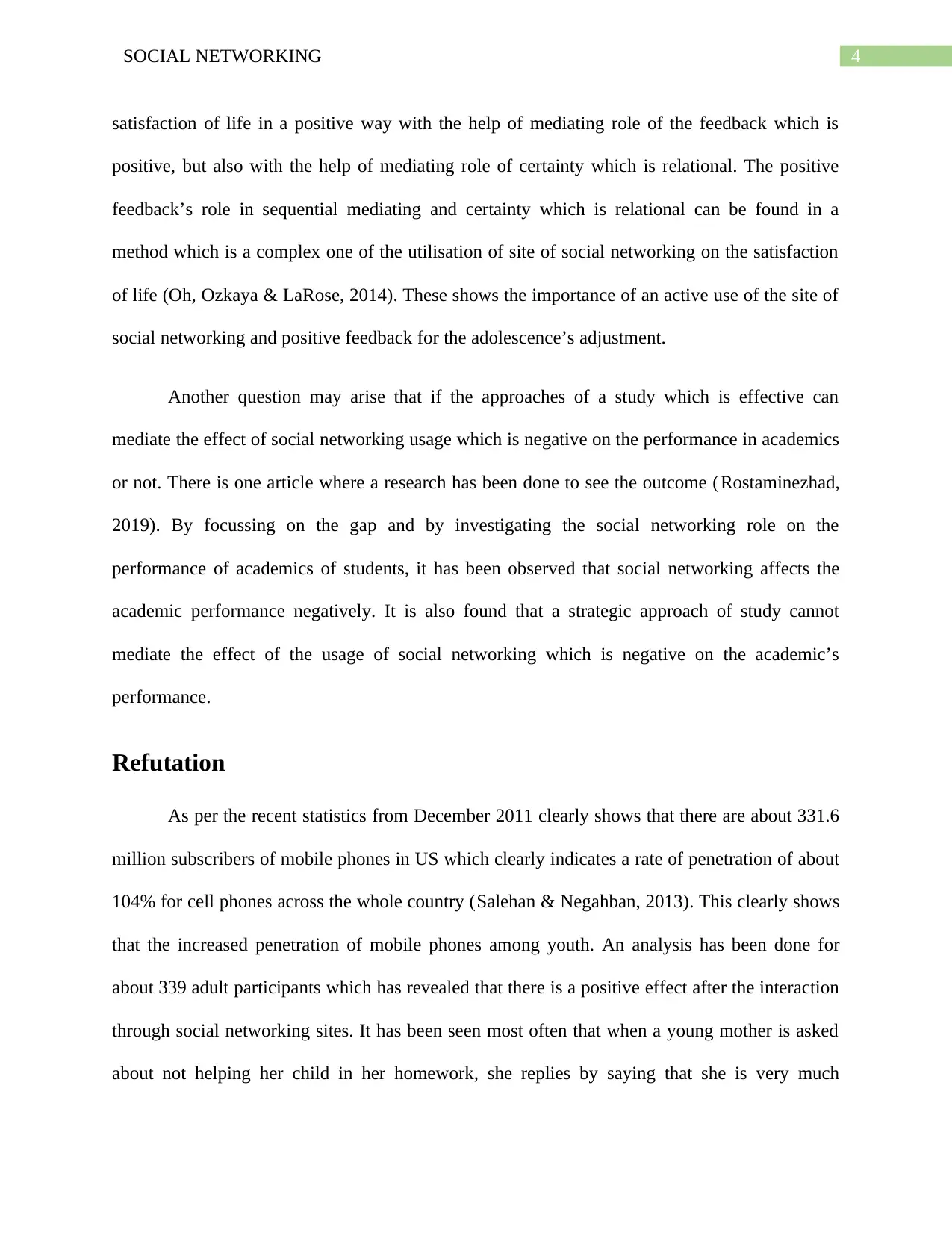
4SOCIAL NETWORKING
satisfaction of life in a positive way with the help of mediating role of the feedback which is
positive, but also with the help of mediating role of certainty which is relational. The positive
feedback’s role in sequential mediating and certainty which is relational can be found in a
method which is a complex one of the utilisation of site of social networking on the satisfaction
of life (Oh, Ozkaya & LaRose, 2014). These shows the importance of an active use of the site of
social networking and positive feedback for the adolescence’s adjustment.
Another question may arise that if the approaches of a study which is effective can
mediate the effect of social networking usage which is negative on the performance in academics
or not. There is one article where a research has been done to see the outcome (Rostaminezhad,
2019). By focussing on the gap and by investigating the social networking role on the
performance of academics of students, it has been observed that social networking affects the
academic performance negatively. It is also found that a strategic approach of study cannot
mediate the effect of the usage of social networking which is negative on the academic’s
performance.
Refutation
As per the recent statistics from December 2011 clearly shows that there are about 331.6
million subscribers of mobile phones in US which clearly indicates a rate of penetration of about
104% for cell phones across the whole country (Salehan & Negahban, 2013). This clearly shows
that the increased penetration of mobile phones among youth. An analysis has been done for
about 339 adult participants which has revealed that there is a positive effect after the interaction
through social networking sites. It has been seen most often that when a young mother is asked
about not helping her child in her homework, she replies by saying that she is very much
satisfaction of life in a positive way with the help of mediating role of the feedback which is
positive, but also with the help of mediating role of certainty which is relational. The positive
feedback’s role in sequential mediating and certainty which is relational can be found in a
method which is a complex one of the utilisation of site of social networking on the satisfaction
of life (Oh, Ozkaya & LaRose, 2014). These shows the importance of an active use of the site of
social networking and positive feedback for the adolescence’s adjustment.
Another question may arise that if the approaches of a study which is effective can
mediate the effect of social networking usage which is negative on the performance in academics
or not. There is one article where a research has been done to see the outcome (Rostaminezhad,
2019). By focussing on the gap and by investigating the social networking role on the
performance of academics of students, it has been observed that social networking affects the
academic performance negatively. It is also found that a strategic approach of study cannot
mediate the effect of the usage of social networking which is negative on the academic’s
performance.
Refutation
As per the recent statistics from December 2011 clearly shows that there are about 331.6
million subscribers of mobile phones in US which clearly indicates a rate of penetration of about
104% for cell phones across the whole country (Salehan & Negahban, 2013). This clearly shows
that the increased penetration of mobile phones among youth. An analysis has been done for
about 339 adult participants which has revealed that there is a positive effect after the interaction
through social networking sites. It has been seen most often that when a young mother is asked
about not helping her child in her homework, she replies by saying that she is very much
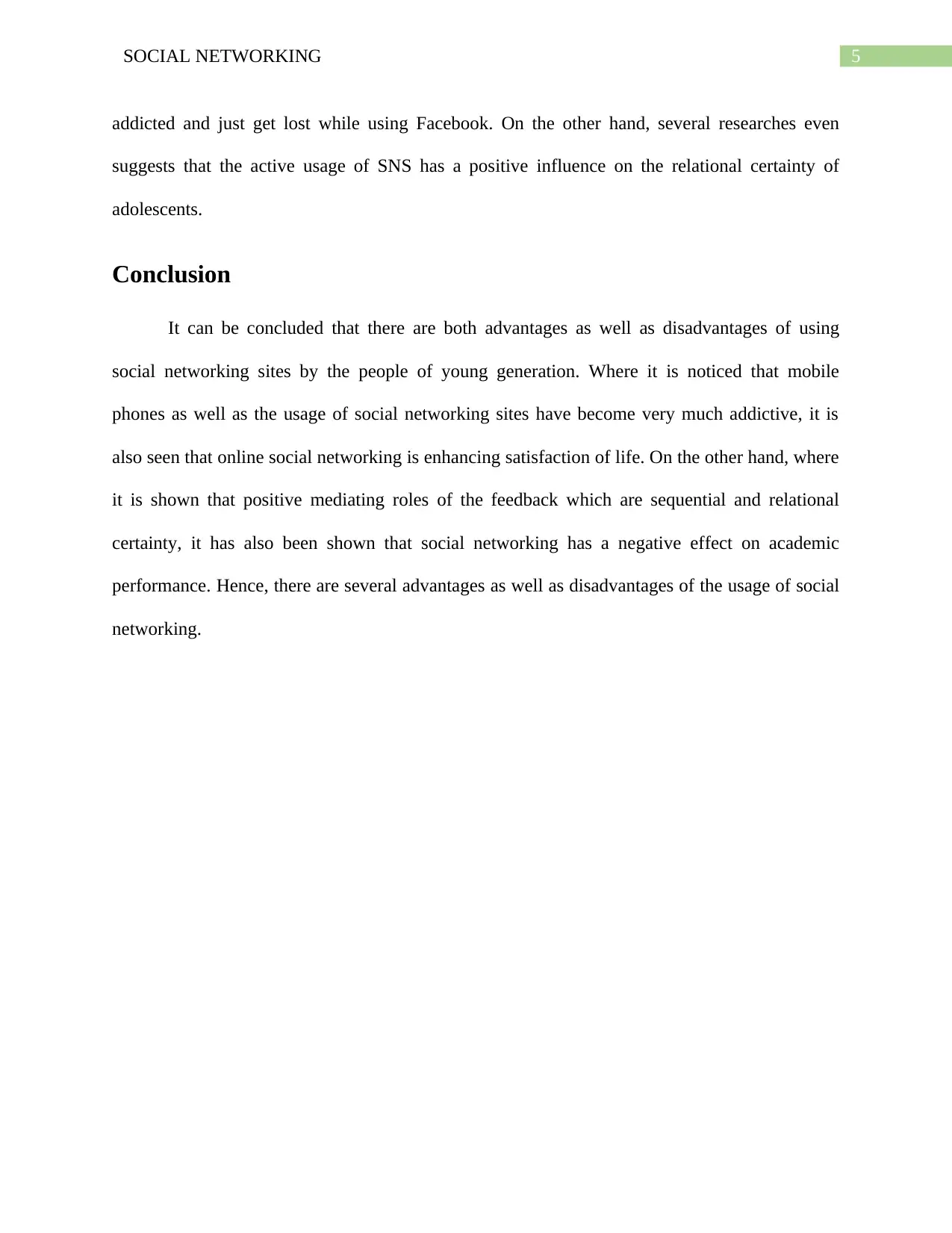
5SOCIAL NETWORKING
addicted and just get lost while using Facebook. On the other hand, several researches even
suggests that the active usage of SNS has a positive influence on the relational certainty of
adolescents.
Conclusion
It can be concluded that there are both advantages as well as disadvantages of using
social networking sites by the people of young generation. Where it is noticed that mobile
phones as well as the usage of social networking sites have become very much addictive, it is
also seen that online social networking is enhancing satisfaction of life. On the other hand, where
it is shown that positive mediating roles of the feedback which are sequential and relational
certainty, it has also been shown that social networking has a negative effect on academic
performance. Hence, there are several advantages as well as disadvantages of the usage of social
networking.
addicted and just get lost while using Facebook. On the other hand, several researches even
suggests that the active usage of SNS has a positive influence on the relational certainty of
adolescents.
Conclusion
It can be concluded that there are both advantages as well as disadvantages of using
social networking sites by the people of young generation. Where it is noticed that mobile
phones as well as the usage of social networking sites have become very much addictive, it is
also seen that online social networking is enhancing satisfaction of life. On the other hand, where
it is shown that positive mediating roles of the feedback which are sequential and relational
certainty, it has also been shown that social networking has a negative effect on academic
performance. Hence, there are several advantages as well as disadvantages of the usage of social
networking.
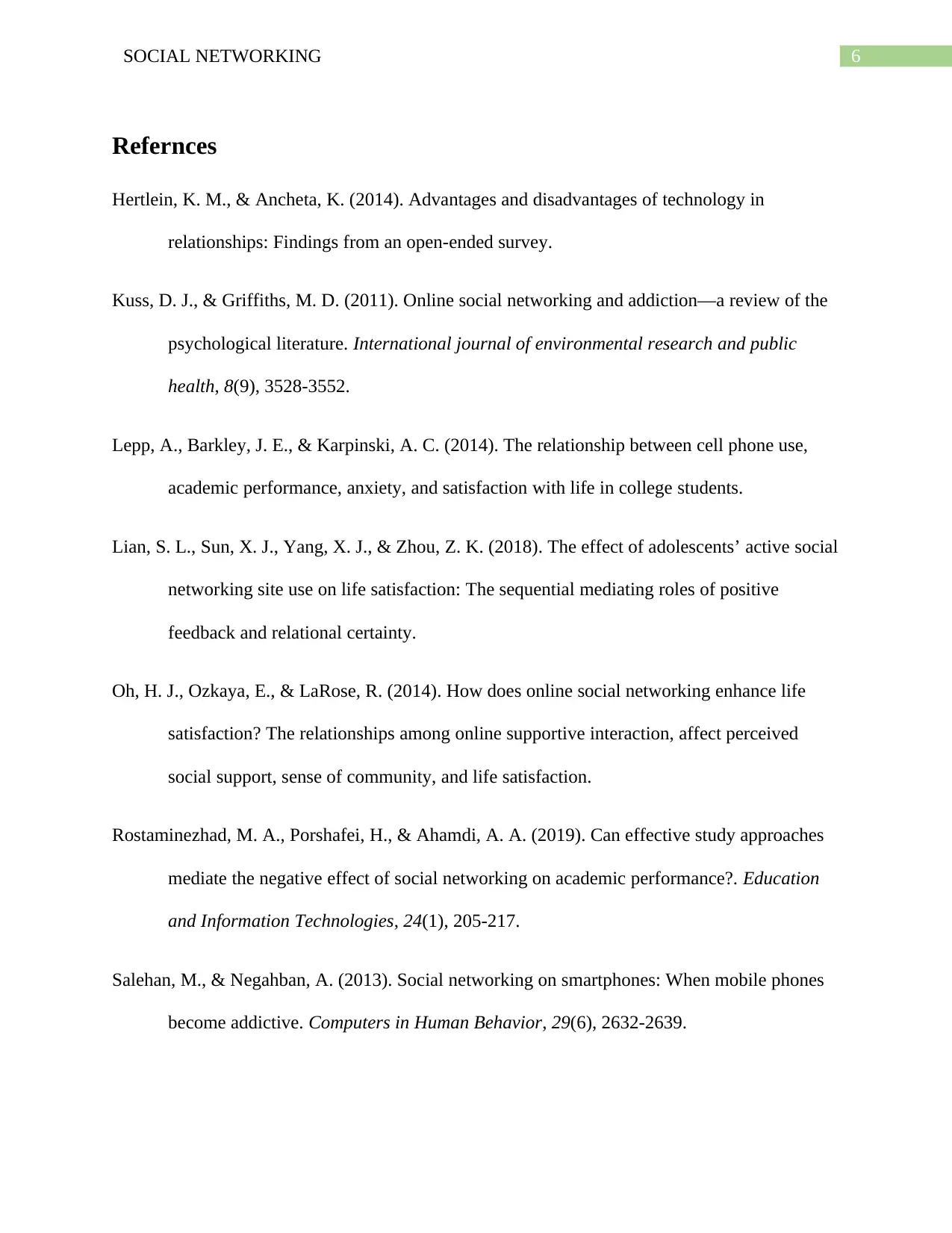
6SOCIAL NETWORKING
Refernces
Hertlein, K. M., & Ancheta, K. (2014). Advantages and disadvantages of technology in
relationships: Findings from an open-ended survey.
Kuss, D. J., & Griffiths, M. D. (2011). Online social networking and addiction—a review of the
psychological literature. International journal of environmental research and public
health, 8(9), 3528-3552.
Lepp, A., Barkley, J. E., & Karpinski, A. C. (2014). The relationship between cell phone use,
academic performance, anxiety, and satisfaction with life in college students.
Lian, S. L., Sun, X. J., Yang, X. J., & Zhou, Z. K. (2018). The effect of adolescents’ active social
networking site use on life satisfaction: The sequential mediating roles of positive
feedback and relational certainty.
Oh, H. J., Ozkaya, E., & LaRose, R. (2014). How does online social networking enhance life
satisfaction? The relationships among online supportive interaction, affect perceived
social support, sense of community, and life satisfaction.
Rostaminezhad, M. A., Porshafei, H., & Ahamdi, A. A. (2019). Can effective study approaches
mediate the negative effect of social networking on academic performance?. Education
and Information Technologies, 24(1), 205-217.
Salehan, M., & Negahban, A. (2013). Social networking on smartphones: When mobile phones
become addictive. Computers in Human Behavior, 29(6), 2632-2639.
Refernces
Hertlein, K. M., & Ancheta, K. (2014). Advantages and disadvantages of technology in
relationships: Findings from an open-ended survey.
Kuss, D. J., & Griffiths, M. D. (2011). Online social networking and addiction—a review of the
psychological literature. International journal of environmental research and public
health, 8(9), 3528-3552.
Lepp, A., Barkley, J. E., & Karpinski, A. C. (2014). The relationship between cell phone use,
academic performance, anxiety, and satisfaction with life in college students.
Lian, S. L., Sun, X. J., Yang, X. J., & Zhou, Z. K. (2018). The effect of adolescents’ active social
networking site use on life satisfaction: The sequential mediating roles of positive
feedback and relational certainty.
Oh, H. J., Ozkaya, E., & LaRose, R. (2014). How does online social networking enhance life
satisfaction? The relationships among online supportive interaction, affect perceived
social support, sense of community, and life satisfaction.
Rostaminezhad, M. A., Porshafei, H., & Ahamdi, A. A. (2019). Can effective study approaches
mediate the negative effect of social networking on academic performance?. Education
and Information Technologies, 24(1), 205-217.
Salehan, M., & Negahban, A. (2013). Social networking on smartphones: When mobile phones
become addictive. Computers in Human Behavior, 29(6), 2632-2639.
Paraphrase This Document
Need a fresh take? Get an instant paraphrase of this document with our AI Paraphraser

7SOCIAL NETWORKING
1 out of 8
Your All-in-One AI-Powered Toolkit for Academic Success.
+13062052269
info@desklib.com
Available 24*7 on WhatsApp / Email
![[object Object]](/_next/static/media/star-bottom.7253800d.svg)
Unlock your academic potential
© 2024 | Zucol Services PVT LTD | All rights reserved.





